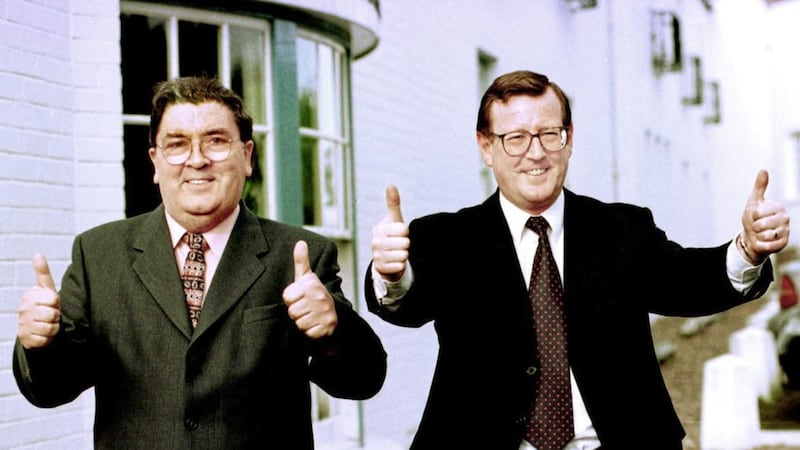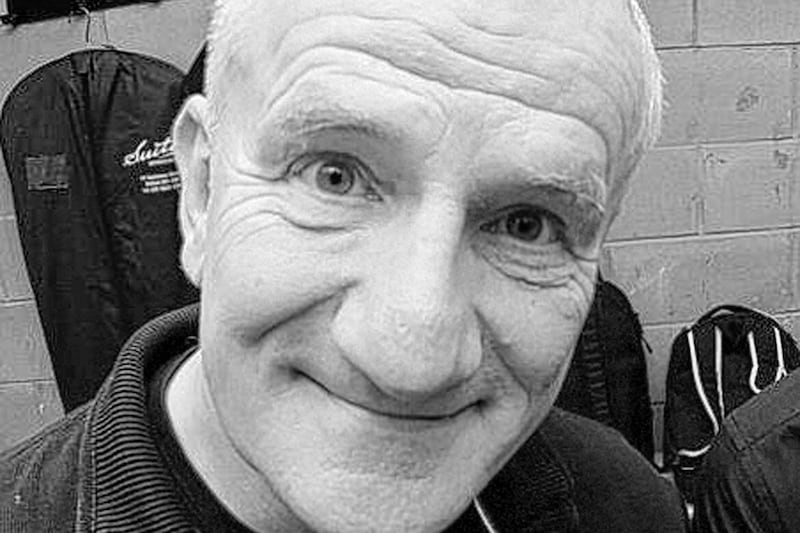I DON'T remember the first time I met John Hume; I was six and he was visiting my father, at the time a Belfast City Councillor. My wife, however, once had a working lunch with both him and David Trimble when employed by a local charity. Her abiding memory of the two was that while John was both engaging and charming, David Trimble confounded everyone by asking for a salad with his roast dinner.
Forty years passed before I was again in the same room as John Hume. This time I was performing at an SDLP post-conference dinner. By agreeing to the gig, I broke a strict personal rule, namely to never get involved with any political party or politician.
As a political satirist, I'd concluded the only way to guarantee objectivity was to isolate myself from those I would satirise, and yet here I was walking onto a stage bedecked in the SDLP party backdrop. I spent the first 10 minutes slagging both the backdrop and just about every 'face' I could recognise in the audience.
The gig went well, for what it was, and as I was about to leave the stage, I again did something I'd never done before or since. Begging the audience's indulgence, I was serious, just for a moment. I said this would be my first and last appearance at any political gathering, explaining my reason for being there was solely out of my admiration for John Hume. I could see John in the audience. Sadly, his illness was already evident – I can but hope he was able to comprehend my compliment.
Upon learning of his passing on Monday morning I commented on social media: "No man worked harder nor risked more in the cause of peace. His legacy is marked, not in words, but in the thousands of lives he helped save. RIP #JohnHume".
Looking at that now, what jumps out at me is 'RIP' – Rest In Peace – for no man is more deserving of rest and peace than John Hume. Peace was the lodestone which directed his life, for which he worked tirelessly, knowing no rest until it was achieved.
As someone who was born into and lived through the Troubles, I, like most of my generation, became resigned to war as a constant in our lives. Death and destruction were almost unnoticed, as the abnormal had become our normal. There seemed no hope with successive British governments callously adopting a policy of 'Ulster-isation', seemingly content to contain the conflict within Ireland.
The 'Irish problem', 700 years in the making, had become the Gordian knot of world conflicts, with the Troubles dragging on longer than the First and Second World Wars combined. While the Gordian knot of ancient history was unravelled with one blow from the sword of Alexander the Great, no sword would unravel our knot, as many had been tried.
Our knot tightened with every death and injury till it looked impregnable. Yet one man, John Hume, took on the seemingly impossible challenge and persevered until he achieved what seemed impossible – peace.
Over decades, exhibiting superhuman tenacity and patience, he slowly loosened the knot of hatred and suspicion, one cord at a time. While his efforts were praised everywhere else in the world, at home they were viewed with suspicion and criticism.
This negativity reached a crescendo when it became known, in 1993, that he'd entered into talks with Sinn Fein. Hume stood alone, vilified on all sides for negotiating with those still involved in armed conflict. Many in UK media and politics denounced his efforts as ill-conceived and beyond the pale, yet we now know successive British governments were in secret communication with the IRA throughout the conflict.
It was at this moment that Hume's commitment and courage shone brightest, as defiantly he faced down his detractors and continued negotiations which culminated in the Good Friday Agreement and 22 years of peace. Soon after his greatest achievement, his Herculean workload began to impact on his health and he entered his slow descent into dementia.
While dementia stole John's memory, history is now the custodian of his achievements, ensuring his story will never fade; his name joins the ranks of other champions of peace such as Ghandi and Martin Luther King, two individuals admired by Hume.
I know I speak for thousands denied by Covid-19 restrictions an opportunity to pay their respects when I offer our sincere condolences to his wife, Pat, and his wider family circle.









